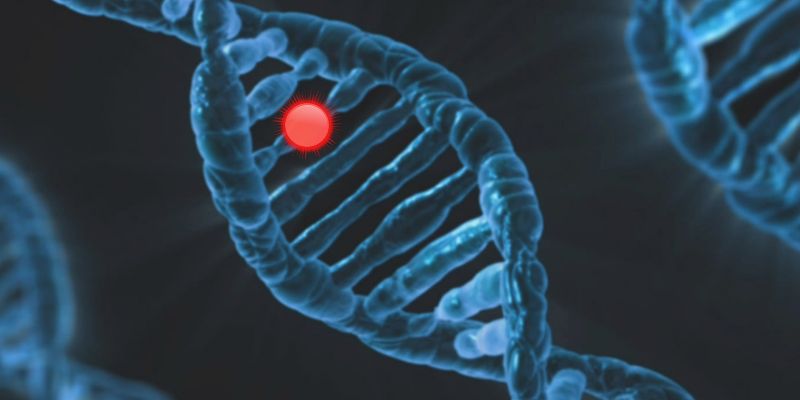Find Out How Your Genes May Influence How Much Fruit, Fish Or Salt You Eat
Oct 17, 2023 By Nancy Miller
The complex relationship between genetics and nutrition is a fascinating topic for investigation. This intriguing idea that our genes may determine our eating has major health and well-being ramifications. Exploring dietary genetics takes us to the intersection of biology and behavior.
This research shows how genetics may affect our preference for certain meals, such as fruits, shellfish, or salt. Research has shown the genetic links to our diets. We now know that our genetic code may explain why some people love specific foods, and others don't. Different eating choices might affect our health.
There is a genetic influence on food consumption and its public health effects. From genetics and nutritional behavior to dietary advice, this article will explore the interesting junction of genes and cuisine. You'll understand better how genetic predispositions impact diet and advance nutritional genomics.

Identifying Genetic Dietary Predispositions' Health Effects
Our genetics affect our diet, which affects our health. We learn that genetic dietary predispositions can considerably impact our health when we examine their effects on nutrition. For instance, genetics may affect our preference for fruits, seafood, and salt. It can affect our health.
The vitamins, antioxidants, and fiber in fruits may reduce the incidence of chronic illnesses and promote a healthy lifestyle for those genetically inclined to eat them. Genetic predispositions to increased salt intake may increase hypertension and cardiovascular disease risk.
Understanding the genetics of eating preferences can also help people choose better. By understanding their genetics, people may customize their meals to their demands and improve their health.
It explores hereditary dietary predispositions and their health effects. By studying the relationship between genetics and diet, we learn how our genes affect our health and how recognizing these genetic influences can help us make healthier food choices, improving our well-being and quality of life.

Accepting Your Genetic Tastes
Knowing how heredity affects our diets and accepting our hereditary interests is intriguing. As we learn more about how genes affect our diets, we must remember that there is no one-size-fits-all approach to nutrition. Some people are genetically predisposed to like fruits, others seafood, and others saltier foods. It's about respecting hereditary tendencies, not right or wrong.
Accepting our genetic tastes helps us achieve a balanced diet that matches our genetics. This acceptance helps people to make educated food selections, leveraging their natural tendencies to achieve a healthy balance. For instance, someone genetically inclined to fruits may choose more fruit-based snacks and sweets to reap health benefits.
However, a fish lover may discover methods to eat more seafood for its nutritious benefits. Accepting our inherited tastes is the first step to a balanced diet. It's a tailored strategy that recognizes our genetic uniqueness and helps us choose healthy, tasty foods. We may balance our natural tastes with a healthy diet by doing so.
Genetic Influences on Fish Consumption
Diet decisions are not exclusively based on personal tastes or culture. Our genes influence our behavior, including fish eating. Studies have demonstrated that genetics can affect our seafood consumption. Some people naturally like fish's tastes and textures, while others don't. This hereditary predisposition to fish eating can affect our health.
How our genes affect fish intake can reveal our health. For individuals genetically predisposed to like fish, people may naturally eat this nutrient-rich cuisine for health benefits. Those whose genetics don't like fish can utilize this knowledge to choose a diet. They may try other omega-3 fatty acid sources or supplements to get the same nutrients.
It explains the genetic effect on fish intake, illuminates the relationship between genes and food, and emphasizes the significance of individualized nutrition. Knowing genetic influences allows people to make decisions that match their biology, improving health.
Why Some Crave Salt More Than Others?
Salt cravings, which may be inherited, are interesting aspects of our diets. Genetic salt sensitivity shows that genes may influence our salty food preferences. It may be inherited, not merely a choice. Some like saltier food because it tastes better, while others prefer milder selections.
Genetic salt sensitivity affects more than taste. Hypertension and cardiovascular disease are connected to excessive salt consumption. Knowing how genetics affect salt appetites might reveal health indicators. Those genetically predisposed to a saltier palate must watch their salt consumption to reduce health hazards, while those less so can adjust their diets.
Hereditary salt sensitivity enhances our understanding of genes and food and emphasizes the need for personalized nutrition. Recognizing that genetics affect salt preferences allows people to make educated food choices that match their heredity, improving flavor and health.
Genetic Counseling and Nutrition Advice
As we study genetics and food habits, we must address ethical issues. Knowing how genes affect dietary choices is a breakthrough in customized nutrition. It can adjust dietary suggestions to people's genetic composition, improving health. However, this advancement poses ethical concerns.
How can genetic nutritional guidance be inexpensive and available to anyone, regardless of genetic predisposition? How do we give tailored nutrition suggestions while respecting individuals' autonomy? Genetic information abuse or misinterpretation raises ethical considerations. As genetic knowledge grows, privacy and appropriate use of genetic data are essential.
The ethical implications of genetics and dietary recommendations are examined. It highlights the problems and prospects of this expanding subject and emphasizes the role of ethical frameworks in genetic dietary advice. Navigating these ethical waters will be crucial to using genetic information to enhance food and health.
Conclusion:
The fascinating path of discovering how our genes affect our diets shows that heredity strongly influences what we eat. Our genetic predisposition to fruits, seafood, or salt affects our health and well-being. We can achieve balanced nutrition by accepting our inherited preferences.
Understanding and accepting our natural predispositions is more important than right or wrong. This acceptance allows us to make intelligent nutritional choices that match our biology, promoting health and energy. Genetic food preferences go beyond human tastes; they reveal how genetics and nutrition are linked.








